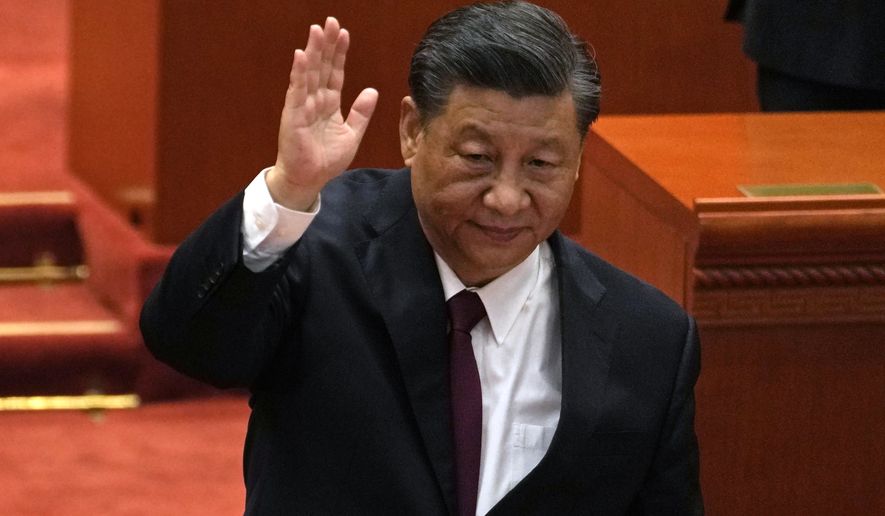Rumors circulating in China and among overseas Chinese social media are claiming Chinese President Xi Jinping, under fire for draconian COVID-19 lockdowns in Shanghai and elsewhere, will step down from power.
The rumors followed a meeting last week of the Party Politburo Standing Committee, the collective leadership group that rules China. They were traced in part to a Chinese-language YouTube video May 4 by Canadian-based blogger appearing under the persona “Lao Deng.” Details of the video quickly spread to social media outlets in China but were quickly censored.
The blogger, citing what he said was a senior Chinese Communist Party (CCP) security source, said a “coup” was launched against Mr. Xi at the meeting of senior party leaders in Beijing. According to blog, Mr. Xi was forced to step aside but will stay in place until a major party meeting later this year.
In his place, current Premier Li Keqiang will take over daily management of the party and government.
The video included the headline “Shocking Coup: Xi Jinping Has Stepped Down; Li Keqiang is the New Master.”
Mr. Xi supposedly agreed to voluntarily step down and will not be held responsible for the current turmoil over lockdowns.
A CIA spokeswoman did not immediately respond to a request for comment.
Rumors in China are usually false. However, in some cases information derived from rumors preceded actual events. Examples include reports of the arrest of the “Gang of Four” Communist leaders following Mao Zedong’s death in 1976, and the downfall of regional CCP leader Bo Xilai on corruption charges in 2012.
Rumors can be unofficial leaks in a nation with little press freedom and tight government control over media. but several analysts of Chinese affairs say the rumors of a leadership change are probably not true.
But they may reflect either a party power struggle in advance of the forthcoming conclave, or deliberate disinformation by Mr. Xi aimed at burnishing the CCP’s tarnished image.
The lockdowns in China, including the financial hub of Shanghai, have angered large segments of China’s 1.4 billion people. Videos have circulated showing anti-government protests against forced quarantines and arrests and detention of people who test positive for COVID-19.
The lockdowns are key to Beijing’s draconian and controversial “zero-COVID” policy, which aims to contain and snuff out the smallest signs of COVID infections through isolation and social control. The World Health Organization recently angered Chinese leaders by called this zero-COVID policy “unsustainable.”
Backlash against the government’s harsh approach is fueling widespread disgust of China’s leadership, including Mr. Xi who has boasted of taking direct control of anti-pandemic measures. An estimated 330 million Chinese are currently in health-related lockdowns in some 45 cities since March, even as restrictions on gatherings and travel in other developed countries are being lifted.
Miles Yu, a former senior State Department policy planning official for China, said rumors in China, whether proven true or not, are often weaponized and used by feuding CCP factions in frequent power struggles.
“When the party as a whole caused a catastrophe in China, the regime usually needs to spread a rumored hope to have a better person emerge to save the party’s image,” Mr. Yu said.
If the rumor turns out to be true, it could be similar ploy used by Mao Zedong in the early 1960s after the disastrous Great Leap Forward. The backyard industrialization program led to the deaths of tens of millions of people from a government-caused famine.
Mao at the time was forced by party leaders to step aside from day-to-day management but remained supreme leader.
“Within four years Mao launched an even deadlier power struggle called the Cultural Revolution that removed all those Communist leaders who had forced him to step aside,” Mr. Yu said. “If the rumor turns out to be true, there is no reason Mr. Xi will not repeat that scenario while he is still in charge.”
Jennifer Zeng, a China affairs analyst who runs the video report Inconvenient Truths, said the rumors allege the power shift will be kept secret in order to give Mr. Xi time to try to correct his bad policies.
Mr. Xi also is said to be voluntarily giving up power in part in order to avoid being put in prison.
Ms. Zeng said there have been some subtle signs of a possible leadership change in Beijing, but the rumors are dubious.
“I don’t find Lao Deng’s claims very credible mainly for one reason,” she stated in a video. “The reason is that he claimed that after Li Keqiang takes over he will start an overall political reform, the CCP will ‘fade out’ from the stage, and China will adopt and establish a Western-style civilization. … Isn’t that too good to be true?”
The rumors are more likely a reflection of a power struggle, she said.
Opponents of Mr. Xi in the Party are said to have orchestrated the action based on the Chinese leader’s hardline policies and his developing a personality cult similar to Mao’s. Mr. Xi is attempting to break the longstanding practice of two terms in office for presidents, seeking a third five-year term later this year.
Another supposed sign of the coup was the canceling of a major speech by Secretary of State Antony Blinken set for May 4, a speech that was postponed after he tested positive for COVID.
One Chinese-language post on Twitter said another indicator was the removal of Mr. Xi’s books from a Beijing bookstore.
The party media organ People’s Daily on May 8 also failed to run one of the usual glowing photos of Mr. Xi on its front page. Instead, only Mr. Li, the premier, and another party leader were mentioned.
For more information, visit The Washington Times COVID-19 resource page.
• Bill Gertz can be reached at bgertz@washingtontimes.com.




Please read our comment policy before commenting.